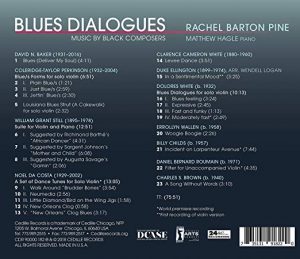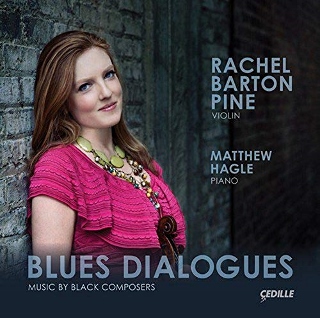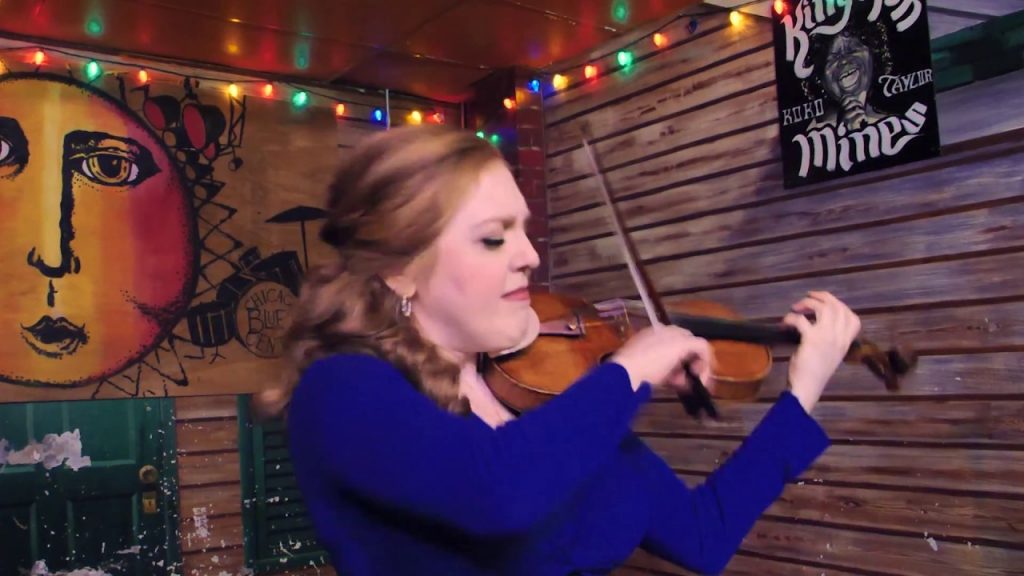AN ALLURING, STYLISH ASSORTMENT OF WORKS
DRENCHED IN THE TIMELESS STYLE OF THE BLUES
I was lucky enough to see violinist Rachel Barton Pine in Los Angeles twice last year with both the Los Angeles Chamber Orchestra and Pasadena Symphony, performing Mozart and Vivaldi. Adroit, sophisticated, vigorous, sensitive and profound only begin to scratch the surface of definitions regarding her multi-faceted playing. Not only is she a master of a variety of styles — from Baroque to Modern — but Pine is also an inspirational coach, a composer, and a champion of new, newfangled and neglected music. Now at 44, she is releasing her 37th (!) disc, the 22nd on Çedille (say-DEE) Records, the label based in Pine’s hometown of Chicago, where she was exposed to the Blues early on. Her latest album is an extraordinarily fascinating collection of violin sonata music by black composers, much of it solo, and some with piano accompaniment by Matthew Hagle. If political correctness has you cringing at the word “black,” know that not all of the composers are African-American; some of the writers — although inspired by this traditionally American art form — are from outside the U.S.A. Regardless of the composers’ birthplaces, there’s an enormous variety of sounds, but they’re — as promised — all Blues Dialogues.
It’s great to hear jazz great David N. Baker’s “Blues (Deliver My Soul),” a glorious mash-up of slow ragtime and syncopation played with incredible strength. Baker should definitely be better-known, as he was proficient at synthesizing jazz and classical music (a.k.a. Third Stream Jazz).
Named after Afro-British composer Samuel Coleridge-Taylor (whose Orchestral “Romance” was recorded by Pine), Coleridge-Taylor Perkinson, a unique voice among contemporary musicians, is represented by Blue/s Forms for solo violin, a work in three short movements (1972), some of it swinging, some with modern-sounding digs, swoops and dissonance. For his Louisiana Blues Strut (A Cakewalk), Pine digs into the harmonic stoutness while allowing Perkinson’s personality to predominate.
William Grant Still’s Suite for Violin and Piano (1943) also has three movements, all inspired by sculptors, but they’re longer, which allows for a more satisfying journey for the listener, especially with Hagle’s decisive playing. Dripping with drive, rhythmic intensity, and melodic folksiness, this gets a soul-searching interpretation that brings out Still’s Bernstein-esque originality. (Still’s The Blues, for violin & piano (arranged from Lenox Avenue) is available digitally only.)
Then there’s the world premiere recording of Noel de Costa’s A Set of Dance Tunes for Solo Violin, rich with bluesy syncopated melodies. This five-movement 1968 composition gives Barton a chance to shine with some bona-fide fiddling, fancy fingerwork, and foot-stomping.
Influenced by folk music, Clarence Cameron White composed violin and orchestral works, and arranged African-American spirituals. His 1927 “Levee Dance” for piano and violin has been oft-recorded for a reason: The mourning theme of “Let My People Go” is couched in simply contagious jauntiness. Among Mark Clague’s copious liner notes for all 23 tracks, you’ll discover that Jascha Heifetz used this as an encore. Also rich in delicious harmonics is Duke Ellington’s “In a Sentimental Mood,” which gets an arrangement from Wendell Logan that turns from eerie and dark to romantic textures we would associate with Shearing and Strayhorn.
Dolores White’s music includes many songs, piano compositions, choral works, instrumental arrangements of Negro spirituals, and original works for instrumental ensemble. The improvisational and repetitious nature of Blues Dialogues for solo violin gives Pine a furious showcase. Yet, while the playing is exceptional, the four  movements may test the patience of some listeners who have over 75 minutes of music to listen to (unless, of course, you’re interested in things like a “stunning tritone double-stop glissando”).
movements may test the patience of some listeners who have over 75 minutes of music to listen to (unless, of course, you’re interested in things like a “stunning tritone double-stop glissando”).
Another female composer, Errollyn Wallen, gets us back in the groove with a refreshing “Woogie Boogie,” followed by her fellow pianist, the always intriguing Billy Childs, whose unsettling tone poem about the 2016 Philando Castile killing, the eight-minute Incident on Larpenteur Avenue (2018), gets a world premiere here. Commissioned by Pine for this album, it has a film-noir, blood-pounding edginess. Pine has always been at the forefront of writing her own cadenzas, and she does so at the top of Daniel Bernard Roumain’s Filter, which is filled with such an intense locomotive pulse and scouring and scratching that you would swear you could smell the smoke coming off of her strings. The album ends with a much-needed contemplative gesture of folkloric nature, Charles S. Brown’s “A Song Without Words” (1974).
My only reservation here is that this many solo works in a row, with a lot of similar-sounding orchestrations in short compositions, jarring to delightful and back again, can grow wearying. But this is an engrossing study for music lovers, and Pine is hands-down one of the most impressive violinists out there.
Blues Dialogues: Music by Black Composers
Rachel Barton Pines, violin
Matthew Hagle, Piano
Çedille Records
23 tracks | 75:51
released October 19, 2018
available on Amazon and iTunes


